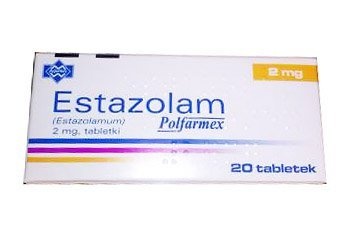

Estazolam Polfarmex

Ask a doctor about a prescription for Estazolam Polfarmex

How to use Estazolam Polfarmex
Package Leaflet: Information for the User
ESTAZOLAM POLFARMEX, 2 mg, tablets
Estazolam
Read the package leaflet carefully before taking the medicine, as it contains important information for the patient.
- Keep this leaflet, you may need to read it again.
- If you have any further questions, ask your doctor or pharmacist.
- This medicine has been prescribed for you. Do not pass it on to others.
- It may harm them, even if their symptoms are the same as yours.
- If you experience any side effects, or if any of the side effects get serious, tell your doctor or pharmacist.
Table of Contents of the Leaflet:
- 1. What is Estazolam Polfarmex and what is it used for
- 2. Important information before taking Estazolam Polfarmex
- 3. How to take Estazolam Polfarmex
- 4. Possible side effects
- 5. How to store Estazolam Polfarmex
- 6. Contents of the pack and other information
1. What is Estazolam Polfarmex and what is it used for
Estazolam belongs to the group of benzodiazepines; it has a sedative effect, facilitates falling asleep, slightly reduces skeletal muscle tension, and has a weak anticonvulsant effect.
Estazolam mainly affects the shortening of the sleep latency period, and to a lesser extent, the prolongation of sleep.
After oral administration, it is quickly absorbed from the gastrointestinal tract. Estazolam is metabolized in the liver and excreted in the urine.
Estazolam Polfarmex is indicated for use:
- for the short-term treatment of sleep disorders (difficulty falling asleep, frequent nocturnal awakenings, early morning awakenings).
2. Important information before taking Estazolam Polfarmex
When not to take Estazolam Polfarmex:
- if you are allergic to the active substance, other benzodiazepines, or any of the other ingredients of this medicine (listed in section 6);
- if you have myasthenia gravis;
- if you have severe respiratory failure;
- if you have severe liver failure;
- if you have sleep apnea syndrome;
- if you have a closed-angle glaucoma;
- during pregnancy and breastfeeding.
Warnings and precautions
Before starting treatment with Estazolam Polfarmex, consult your doctor or pharmacist.
States of tension and anxiety related to everyday problems are not an indication for the use of estazolam.
Patients taking the medicine for a long time or taking high doses should be under constant medical supervision. Long-term use of the medicine leads to a gradual weakening of its effect due to the development of tolerance.
The persistence or worsening of insomnia after a 7-10 day period of treatment may indicate another underlying disorder and be a reason for verifying the diagnosis.
Long-term use of estazolam may lead to physical and psychological dependence. The risk of dependence increases with the increase in dose and duration of treatment, as well as in patients who abuse alcohol and drugs. Sudden withdrawal of the medicine after a long period of treatment with high doses may cause the occurrence of a withdrawal syndrome, the symptoms of which are insomnia, headaches, muscle pain, increased anxiety and tension, psychomotor agitation, confusion, and irritability.
In severe cases, the following may occur: depersonalization (feeling of personality change); derealization (changes in perception of reality); hyperacusis; numbness and tingling of limbs; hypersensitivity to light, noise, and touch; hallucinations or seizures. The severity of the withdrawal syndrome symptoms depends on the duration of treatment and the dose of the medicine. In patients taking high doses of the medicine or taking it for more than 4 weeks, the medicine should be withdrawn under medical supervision, gradually reducing the dose.
Estazolam should be used with special caution in patients with a history of mental illness after detoxification treatment for drug overdose. Special caution should be exercised in patients with liver and kidney failure, as well as in patients over 65 years of age.
In these patients, it is recommended to reduce the initial dose and individually adjust the dose depending on the patient's condition. In elderly patients, the risk of side effects increases, especially disorders of orientation and motor coordination.
Estazolam may exacerbate respiratory failure; caution should be exercised in patients with respiratory disorders, and the smallest recommended doses should be used.
The medicine should be withdrawn in case of paradoxical reactions (states of psychomotor agitation, insomnia, irritability, delusions, nightmares, hallucinations, psychosis, changes in behavior). The medicine may cause anterograde amnesia, especially in the absence of 7-8 hours of sleep after taking the medicine.
There are no data on the safety and efficacy of the medicine in children and adolescents under 18 years of age.
During long-term treatment with estazolam, periodic blood tests (morphological with smear) and urine analysis are recommended.
During treatment with estazolam and up to 3 days after its completion, do not consume any alcoholic beverages.
You should talk to your doctor, even if the above warnings refer to situations that occurred in the past.
Other medicines and Estazolam Polfarmex
Tell your doctor or pharmacist about all the medicines you are taking or have recently taken, as well as the medicines you plan to take.
Alcohol enhances the sedative effect of estazolam and increases the risk of paradoxical reactions (psychomotor agitation, aggression, irritability).
Estazolam enhances the effect of centrally acting depressants (general anesthetics, neuroleptics, antihistamines with a sedative effect, as well as sedatives, anxiolytics, antidepressants, anticonvulsants), increases the euphoric effect of opioid analgesics, increasing the risk of psychological dependence.
Drugs that inhibit the cytochrome P450 system (e.g., cimetidine, erythromycin) may enhance the effect of benzodiazepine derivatives. Oral contraceptives accelerate the metabolism of estazolam; at the same time, the use of these drugs may weaken the effect of estazolam. Smoking weakens the effect of the medicine.
Pregnancy and breastfeeding
If you are pregnant or breastfeeding, or think you may be pregnant, or are planning to have a baby, ask your doctor or pharmacist for advice before taking this medicine.
Estazolam Polfarmex is contraindicated during pregnancy and breastfeeding.
Driving and using machines
Do not drive or operate machinery while taking the medicine.
Estazolam Polfarmex contains excipients - lactose monohydrate and sodium
The medicine contains lactose monohydrate. If you have been diagnosed with an intolerance to some sugars, you should consult your doctor before taking the medicine.
The medicine contains less than 1 mmol of sodium (23 mg) in one tablet, which means the medicine is considered "sodium-free".
3. How to take Estazolam Polfarmex
Always take this medicine exactly as your doctor has told you.
If you are not sure, ask your doctor or pharmacist.
The dose of the medicine should be adjusted individually, depending on the age and response of the patient to the medicine.
In the treatment of sleep disorders: the recommended initial dose is 1 to 2 mg (half - 1 tablet) 30 minutes before sleep.
Elderly patients (over 65 years): the dose of the medicine should be reduced by half.
Patients with liver and kidney failure: it is recommended to reduce the dose of the medicine.
Treatment should be started with the smallest recommended dose. Do not exceed the recommended dose of the medicine.
Overdose of Estazolam Polfarmex
Any overdose requires medical intervention.
Symptoms of estazolam overdose: drowsiness; confusion (disorientation); coordination disorders (ataxia); hypotension; respiratory disorders; rarely, coma.
Life-threatening may be mixed poisoning with estazolam and alcohol or estazolam and other centrally acting depressants. In case of estazolam poisoning, induce vomiting (provided that consciousness is preserved) and administer activated charcoal.
Contact your doctor immediately.
Missed dose of Estazolam Polfarmex
Do not take a double dose to make up for a forgotten dose.
4. Possible side effects
Like all medicines, this medicine can cause side effects, although not everybody gets them.
Drowsiness during the day; headaches; lethargy; dizziness; asthenia (reduced functional capacity of the body); constipation; dry mouth; anxiety; coordination disorders; nausea; fatigue; malaise; general weakness; nervousness; thinking disorders; disorientation; prolonged reaction time.
Other, rare (in 1 to 10 patients out of 10,000) side effects observed during treatment with the medicine: palpitations; changes in appetite; vomiting; bloating; increased thirst; muscle cramps; joint and muscle pain; anterograde amnesia; apathy; emotional lability; sleep disorders; cough; asthma; rash; urticaria; vision disorders; changes in taste; menstrual disorders; occasionally, arrhythmia; fainting; changes in blood count (leukopenia, agranulocytosis); changes in body weight; ataxia; decreased libido (decreased sexual desire); paradoxical reactions.
Long-term use of the medicine may cause physical or psychological dependence. Sudden withdrawal of the medicine after long-term use may cause the occurrence of withdrawal syndrome symptoms.
In elderly patients, neurological symptoms (feeling of fatigue, coordination disorders, muscle tension disorders) may occur. These symptoms may cause falls and dangerous bone fractures.
Reporting side effects
If you experience any side effects, including those not listed in the leaflet, tell your doctor or pharmacist, or nurse. Side effects can be reported directly to the Department of Monitoring of Adverse Reactions to Medicinal Products of the Office for Registration of Medicinal Products, Medical Devices, and Biocidal Products:
Al. Jerozolimskie 181C
02-222 Warsaw
Phone: 22 49-21-301
Fax: 22 49-21-309
Website: https://smz.ezdrowie.gov.pl
Side effects can also be reported to the marketing authorization holder.
By reporting side effects, you can help provide more information on the safety of the medicine.
5. How to store Estazolam Polfarmex
Keep the medicine out of the sight and reach of children.
Do not use this medicine after the expiry date stated on the carton and blister after: "EXP".
The expiry date refers to the last day of that month.
Do not store above 25°C.
Medicines should not be disposed of via wastewater or household waste. Ask your pharmacist how to dispose of medicines no longer required. This will help protect the environment.
6. Contents of the pack and other information
What Estazolam Polfarmex contains
- The active substance is estazolam. One tablet contains 2 mg of estazolam.
- The other ingredients are: corn starch, lactose monohydrate, povidone, sodium carboxymethyl starch (type A), magnesium stearate.
What Estazolam Polfarmex looks like and contents of the pack
The pack contains 20 or 28 tablets.
Marketing authorization holder and manufacturer
Polfarmex S.A.
ul. Józefów 9
99-300 Kutno
Phone: 24 357 44 44
Fax: 24 357 45 45
e-mail: [email protected]
Date of last revision of the leaflet:
- Country of registration
- Active substance
- Prescription requiredYes
- Manufacturer
- ImporterPolfarmex S.A.
- This information is for reference only and does not constitute medical advice. Always consult a licensed doctor before taking any medication. Oladoctor is not responsible for medical decisions based on this content.
- Alternatives to Estazolam PolfarmexDosage form: Tablets, 2 mgActive substance: estazolamManufacturer: Chemiczno-Farmaceutyczna Spółdzielnia Pracy ESPEFAPrescription not requiredDosage form: Tablets, 2 mgActive substance: estazolamManufacturer: Tarchomińskie Zakłady Farmaceutyczne "Polfa" S.A.Prescription requiredDosage form: Tablets, 15 mgActive substance: midazolamManufacturer: Recipharm Leganes S.L.U. Roche Polska Sp. z o.o.Prescription required
Alternatives to Estazolam Polfarmex in other countries
The best alternatives with the same active ingredient and therapeutic effect.
Alternative to Estazolam Polfarmex in Ukraine
Alternative to Estazolam Polfarmex in Spain
Online doctors for Estazolam Polfarmex
Discuss dosage, side effects, interactions, contraindications, and prescription renewal for Estazolam Polfarmex – subject to medical assessment and local rules.











